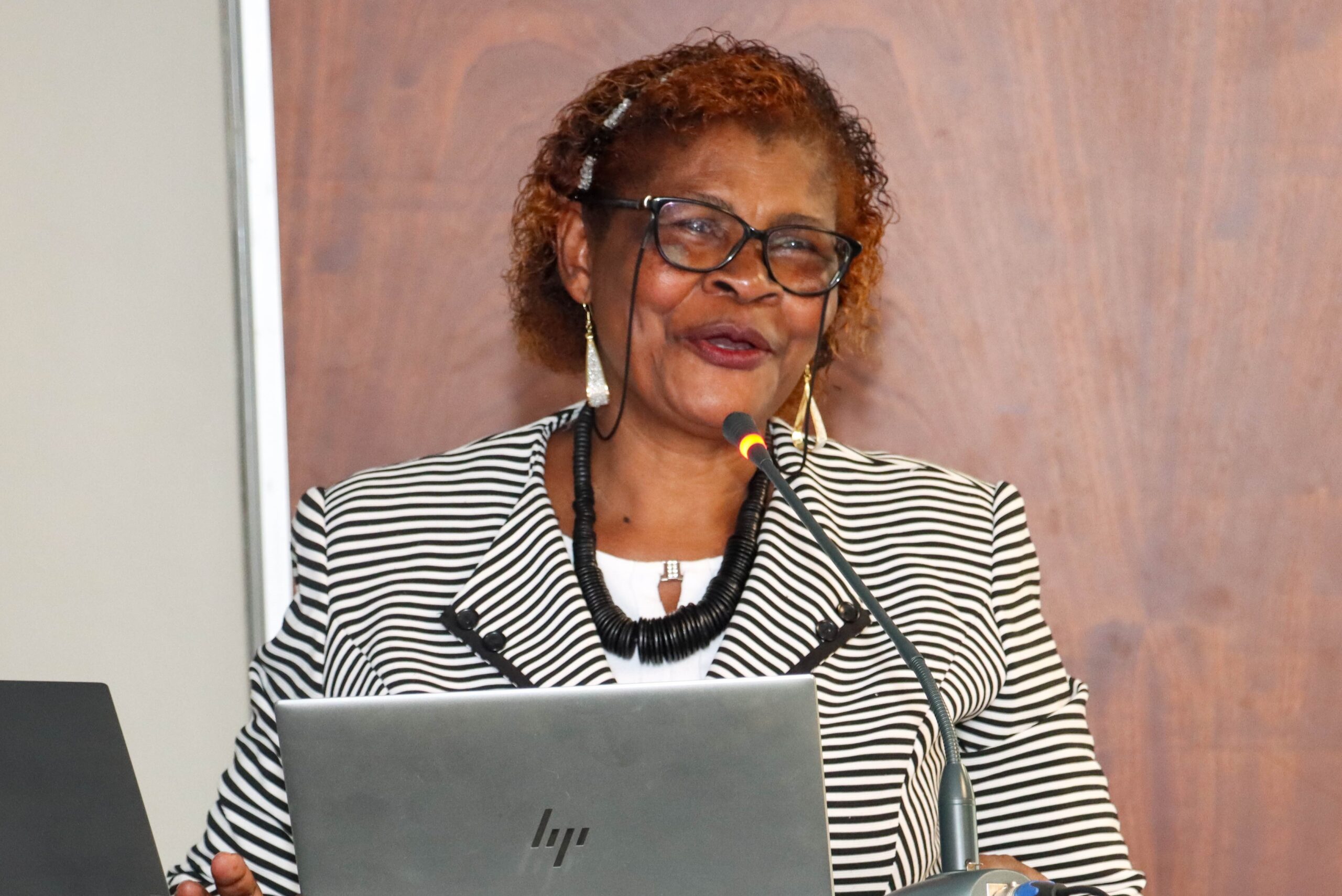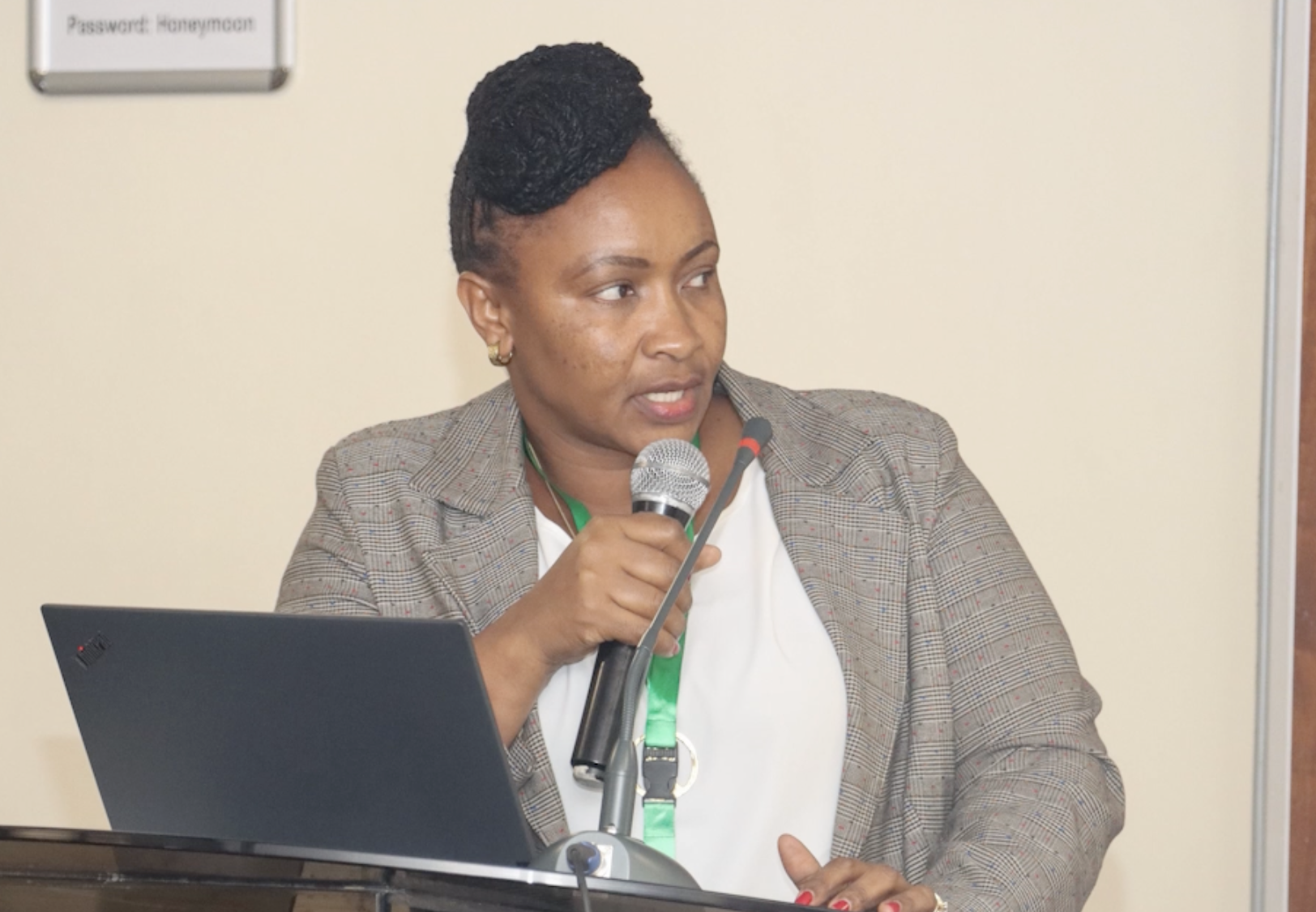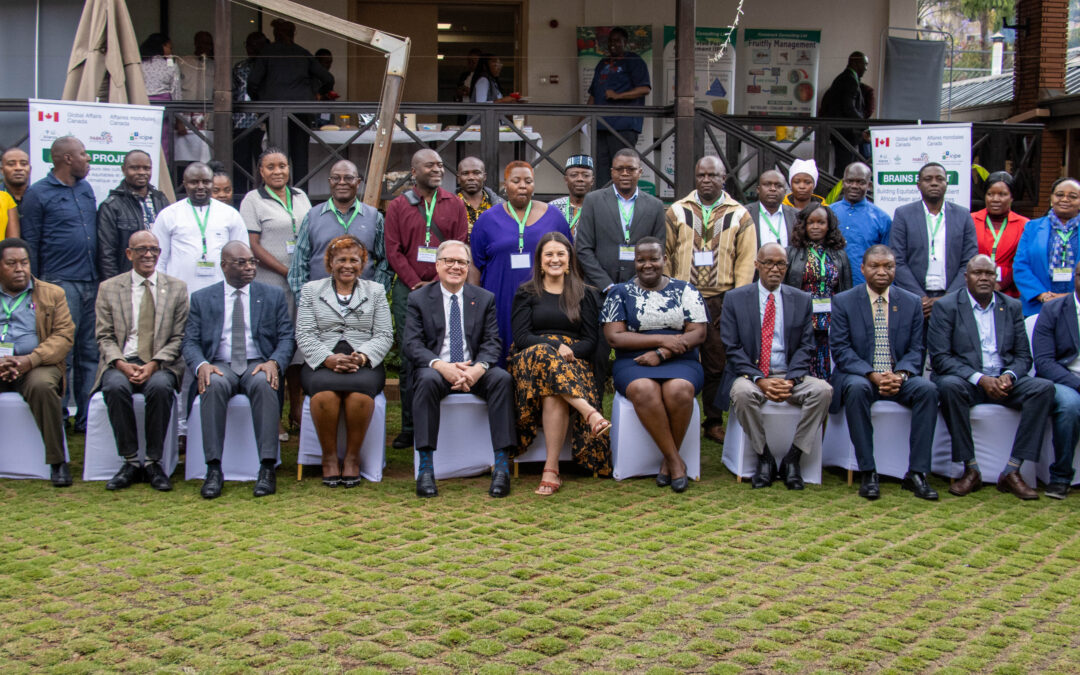By Yohane Chideya1, Liz Ng’ang’a2, Dennis Ong’or1, Esther Nzuki1, Ayuka Fombong2, Warren Arinaitwe1, Ekesi Sunday2 & Jean Claude Rubyogo1
Alliance of Bioversity International and CIAT/ Pan-Africa Bean Research Alliance1
International Centre of Insect physiology and Ecology (icipe)2
The journey of collaboration between beans, insects and fruit trees actors kicked off in Nairobi from October 7 to 9 2024, with the launch of the Building Equitable Climate-Resilient African Bean and INsect Sector (BRAINS) Project, spearheaded by the Alliance of Bioversity International and CIAT, alongside the Pan-Africa Bean Research Alliance (PABRA) and the International Centre of Insect Physiology and Ecology (icipe).
Courtesy of a CAD $20 million grant from the Global Affairs Canada, the BRAINS Project through this partnership is poised to uplift the lives of over 70 million people directly and indirectly across 15 Africa countries over a period of five years. With a focus on integrating beans, beneficial insects and fruit trees, primarily mangoes, citrus and avocados, BRAINS will transform agriculture across Burundi, Cameroon, Democratic Republic of Congo, Ethiopia, Ghana, Guinea, Kenya, Madagascar, Malawi, Mozambique, Rwanda, Tanzania, Uganda, Zambia, and Zimbabwe, through the promotion of low-carbon practices and enhancement of climate resilience among women and youth farmers, by accelerating the delivery of participatory climate-smart technologies.
For three consecutive days, nearly 100 delegates from participating countries—59% of whom were female—gathered in Kenya’s capital to collaborate and strategize on implementing the initiatives. The delegates engaged in intensive discussions, working together to establish both short-term and long-term targets for all key aspects of the venture. This approach aims to ensure that the initiatives are effectively tailored to meet specific needs of each country while promoting sustainable agricultural practices across the region.

Frame 2 and 3: Some of the participants strategizing on key activities to meet both short and long-term goals and Eileen Nchanji, Gender and Social Inclusion expert (right) making a presentation – Photos by Esther Nzuki
Creating new possibilities
Climate change poses a major challenge for agriculture in sub-Saharan Africa where many smallholder farmers depend on rain-fed farming for their livelihoods. Climate-smart agricultural practices are emerging as a promising solution to address this issue. These practices offer a range of benefits, including increased productivity, enhanced resilience, higher incomes for farmers, reduced greenhouse gas emissions, and improved soil health. The impacts of climate change are increasingly evident, manifesting as extreme temperatures, irregular precipitation patterns, and climate-related natural disasters that threaten the lives of millions, leaving them without shelter or food and resulting in substantial economic losses. Additionally, these climatic shifts have adversely affected agricultural productivity, leading to crop failures, reduced yields, and heightened pressures from pests and diseases.
For these reasons, the BRAINS project will empower farmers and agro-processors by providing access to participatory climate-smart technologies. It aims to enhance the adaptability of agricultural practices in the face of climate change, focusing not only on increasing yields but also on ensuring that these practices are environmentally sustainable and economically viable.
For many, the idea of integrating beans and insects may seem unusual. While beans are a staple food in numerous African countries – rich in protein and essential nutrients – they also play a vital role in improving soil health through nitrogen fixation, making them a sustainable choice for farmers. Insects, often regarded as pests, are typically overlooked. However, through the BRAINS initiative, a transformative approach is being proposed: by incorporating insects into agricultural systems, the countries can create a sustainable source of protein, enhance biodiversity, and reduce waste. Additionally, insects can act as natural pest control, minimizing the need for chemical pesticides. Insects such as pollinators also enhance the productivity of flowering crops through pollination services which providing alternative sources of income through associated bioproducts such as honey, beewax and propolis (which is medicinal).
On the other hand, edible insects such as grasshoppers and crickets boast a rich profile of proteins, carbohydrates, fats, minerals, vitamins, and bioactive compounds essential for human health and nutrition. Their impressive nutrient content, coupled with their availability and low production costs, has led to a growing trend of using them as a substitute protein source in animal feed. Moreover, insects such as black soldier flies are effective recyclers of organic wastes into nutritious, chitin-rich organic frass fertilisers that enhance soil health and crop yield. icipe has designed improved, low-tech options for mass-rearing of edible insects and supported the development of harmonised standards and policies for safe, equitable use and trade in edible insect.
Thus, the systems will incorporate fruit trees, primarily mango and avocado, which will be supported by environmentally friendly pest and disease management options; organic soil fertility enhancement, through insect-based frass biofertilisers; and enhanced pollination services by the bees. Moreover, beans enhance nitrogen fixation and soil enrichment; fruit trees and beekeeping-friendly trees are perennial and drought-tolerant, thus helping to protect landscapes, restore soil function and fertility, and helping in carbon sequestration. The systems will be complemented with components of the icipe climate-smart push-pull technology, which intercrops legumes and fodder grass to control cereal pests; and the Centre’s modern, climate-smart and sustainable beekeeping technologies.
Additionally, the trade in edible insects represents a significant source of revenue, with the global market valued at approximately $1.2 billion annually. This burgeoning industry is further driven by the increasing demand for sustainable food sources and the rising costs of traditional animal feed and feed ingredients, highlighting the urgent need for more affordable and eco-friendly alternatives.
“Climate Change is really hitting hard, and it is essential for farmers to diversify their crops beyond beans, while entrepreneurs explore opportunities beyond the same. This is where the BRAINS Project plays a crucial role. It provides a pathway for improvement and resilience,” highlighted PABRA Director and Global Bean Programme Leader, Jean Claude Rubyogo.
Implementation and capacity development
Following the successful launch of the BRAINS Project, a comprehensive series of activities is being devised. These initiatives include capacity building and profiling of processors, aimed at empowering farmers, youth, and women-led enterprises across all 15 benefiting countries. By collaborating with National Agricultural Research Systems (NARS), BRAINS will leverage existing value chains in insects, fruits, and beans to enhance production. Training sessions will also be conducted focusing on climate-smart agricultural practices, incorporating insights from nutrition experts and equip farmers with essential knowledge on climate adaptation.
Representing all the National Agricultural Research Systems (NARS), Felister Makini, Deputy Director General of the Kenya Agricultural and Livestock Research Organization (KALRO), described this new venture as a breakthrough in tackling the climate change and agricultural challenges currently facing the sub-Saharan African region, home to over 1.2 billion people.
She stated, “It is inspiring to see such a diverse group of experts come together to address the challenges affecting millions. We are committed to providing our support to ensure that the Initiative achieves its goals.”

Frame 5: MAKINI: Appreciated the great collaboration among key players in various value chains – Photo by Esther Nzuki
Documentation of carbon stocks and profiling of financial actors will then be followed by creation of linkages among all stakeholders to effectively support farmers across various value chains. Furthermore, there will be the promotion of the use of clean materials and fostering of multi-stakeholder platforms to commercialize the production and consumption of beans and edible insects.
As part of the initiative, BRAINS will engage 5,000 change agents, directly benefiting 10 million individuals, with 60% of them being women. This includes five million smallholder farmers, five million consumers and school-age children, as well as a variety of value chain actors. The project will also catalyze the growth of 2,000 small and medium enterprises, while indirectly supporting an additional 50 million consumers, businesses, and households.
With a focus on nutrition, gender, and market penetration, the project emphasizes a collaborative and cost-effective approach to implementation. NARS will lead this effort in their respective countries, partnering with local organizations, universities, and private enterprises to promote sustainable practices.
During the inception forum, Dr. Beatrice Muriithi, a socio-economist from icipe, briefed participants on the importance of leveraging existing data to utilize resources responsibly. Muriithi is certain that this strategy is vital for countries where baseline assessments were not carried out, to ensure that strategies are tailored to the specific needs of each region.
“Since a comprehensive gender analysis was conducted at baseline, we should only employ full-fledged gender analysis in extreme cases where additional data is necessary for informed decision-making,” she explained.

Frame 6: MURIITHI: Highlighted significance of leveraging data for informed decision-making – Photo by Esther Nzuki
Sunday Ekesi, Deputy Director General of icipe, added: “We consider insects from a broad perspective, encompassing human health, environmental health, plant health, and animal health. Insects are not inherently bad, as many people believe, and that’s the message this project aims to convey.”
To facilitate smooth implementation and stay on track, the project team leader, Warren Arinaitwe emphasized the urgency of strategic planning to maintain the project’s momentum and to ensure that all stakeholders are prepared to fulfill their respective roles effectively.
He stated: “Submission of work plans by each country is necessary to align activities with the overall project goals early enough, allowing time for necessary adjustments.”
Canadian High Commissioner to Kenya, Christopher Thornley, expressed his delight with the venture, stating: “It is impressive to witness such collaboration across diverse areas of expertise. This kind of partnership is exactly what will drive progress. While it will not be easy, together we can achieve remarkable things. Let us join forces to build a future where everyone has access to nutritious food and sustainable livelihoods, creating better economic, health, and ecological outcomes for future generations.”
icipe Director General Dr. Abdou Tenkouano expressed his enthusiasm for the collaboration, noting its potential to transform agriculture in the Sub-Saharan African region.
He said, “BRAINS advances our partnership with the Alliance and PABRA by integrating beans and insects. My reflections on BRAINS are B for Bees and Beans, R for Rain and Resilience, A for Partnerships for Action, I for Income, N for Nitrogen Fixing and Nutrition, and S for Sustainability.”

Frame 10: TANKOUANO: We are exploring ways to use insects to clean the environment – Photo by Esther Nzuki
His Alliance Counterpart, Juan Lucas Restrepo, shared similar sentiments: “We greatly appreciate this new partnership between Bioversity – CIAT/PABRA and icipe, in their efforts to diversify and find climate-resilient solutions through BRAINS Initiative. This is vital in contributing towards global biodiversity targets. We are look forward to further strengthening this collaboration to create meaningful impact on livelihoods across the African continent.”

Frame 11: RESTREPO: Looking forward to meaningful impact on livelihoods in Africa through BRAINS Project





